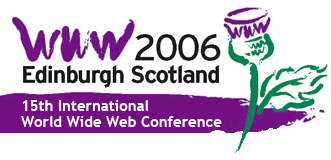Refereed Track: Browsers & User Interfaces
The Web browser UI has become the face of cyberspace, and a ubiquitous access mechanism for most of the world's online services and media channels. As new uses of the Internet are invented and network bandwidth goes up, web user interfaces will need to become richer and more interactive. Systems that facilitate interpersonal communication and transactions (e.g., meeting rooms, communities of trust, social networks, web logs, auctions) are becoming very popular and present interesting design challenges. To be successful, deployment on the Web requires delivering a good user experience across a variety of platforms and form factors, which is a non-trivial exercise. Also, given the Web's international nature, content and services may need to be supported in a range of languages, with cultural sensitivity. The spread of pervasive and ubiquitous computing has resulted in new types of interactions, such as those with mobile phones, embedded devices, location-aware services and shared displays. One of the questions this track should address is whether familiar paradigms will be able to evolve to accommodate new devices, high bandwidth interaction, and future use cases, or whether a radical change is needed in Web interface design.
The Browsers and User Interfaces track at WWW'2006 focuses on promoting novel research directions and providing a forum where researchers, theoreticians, and practitioners can introduce new approaches, paradigms, applications, share their knowledge and opinions about problems and solutions related to accessing and interacting with data , services, and other humans over the Web. We invite original papers describing both theoretical and experimental research including (but not limited to) the following topics:
- Browsers and user experience on mobile devices
- Browser interoperability
- Novel client-side applications
- Multimodal interfaces, including speech interaction
- Information visualization on the Web
- Multilingual Web content design
- Novel browsing and navigation paradigms
- Web interaction with the real world, including robotics and sensor networks
- Adaptive Web displays and Web personalization
- Ubiquitous web access, shared displays, and wearable computing
- Web usability and user experience
- Web accessibility
- Web-based collaboration and collaborative Web use
- Web-logs and online journalism
Accepted Papers
Richard Atterer Monika Wnuk Albrecht Schmidt Harald Weinreich Hartmut Obendorf Eelco Herder Matthias Mayer Nominated for Best Student Paper AwardMicah Dubinko Ravi Kumar Joseph Magnani Jasmine Novak Prabhakar Raghavan Andrew Tomkins Nominated for Best Paper Award Daniel Gruhl Daniel Meredith Jan H. Pieper Kirstie Hawkey Kori M. Inkpen Joeng Kim Ricardo A. Baratto Jason Nieh Chairs
- Yoelle Maarek, IBM Research Haifa, Israel (Vice Chair)
- Krishna Bharat, Google Inc, USA (Deputy Chair)
PC Members
- Yoelle Maarek, IBM Research, Haifa, Israel (Vice Chair)
- Krishna Bharat, Google Inc., USA (Deputy Chair)
- Eytan Adar, University of Washington, USA
- Orkut Buyukkokten, Google Inc., USA
- Bay-Wei Chang, Google Inc., USA
- Ed H. Chi, Palo Alto Research Center, USA
- Susan Dumais, Microsoft Research, USA
- Dorée Duncan Seligmann, Avaya Labs, USA
- Juliana Freire, University of Utah, USA
- Gene Golovchinsky, FX Palo Alto Laboratory, USA
- Suhit Gupta, Columbia University, USA
- Joseph A. Konstan, University of Minnesota, USA
- Michael R. Lyu, The Chinese University of Hong Kong, Hong Kong
- Paul P. Maglio, IBM Almaden Research Center, USA
- Rob Miller, MIT, USA
- Andreas Paepcke, Stanford University, USA
- Vladimir Soroka, IBM Haifa Research Lab, Israel
- Don Turnbull, University of Texas at Austin, USA
- Terry Winograd, Stanford University, USA
- Xing Xie, Microsoft Research Asia
Additional Reviewers
|

